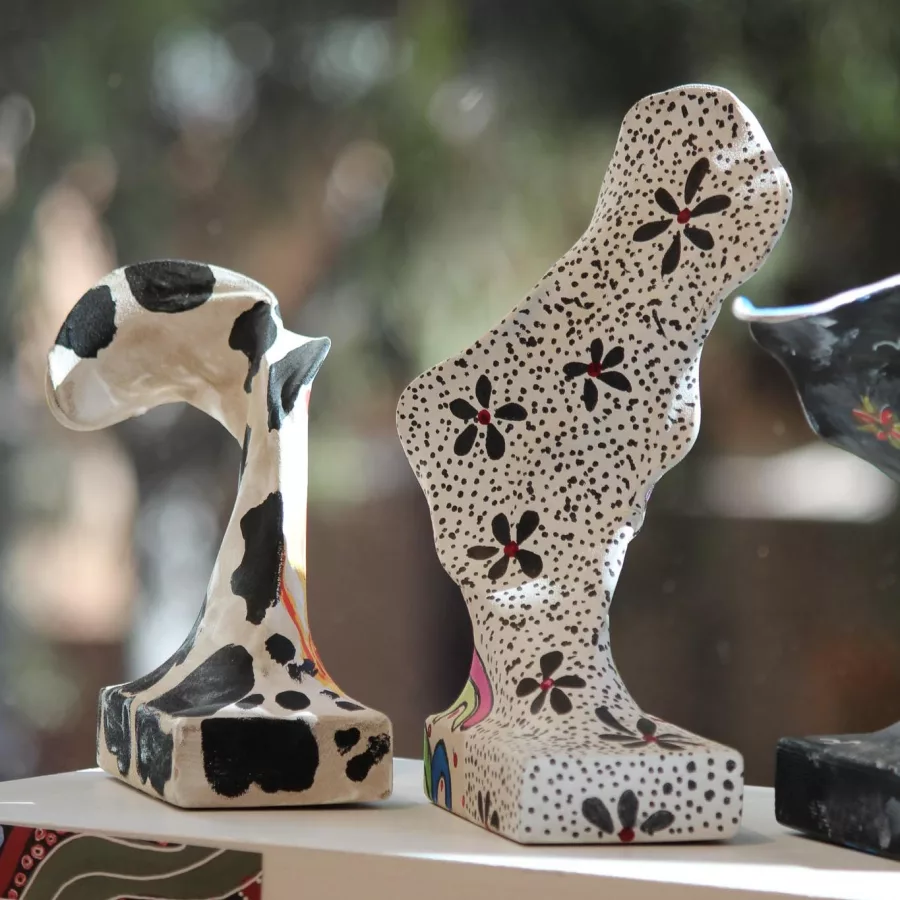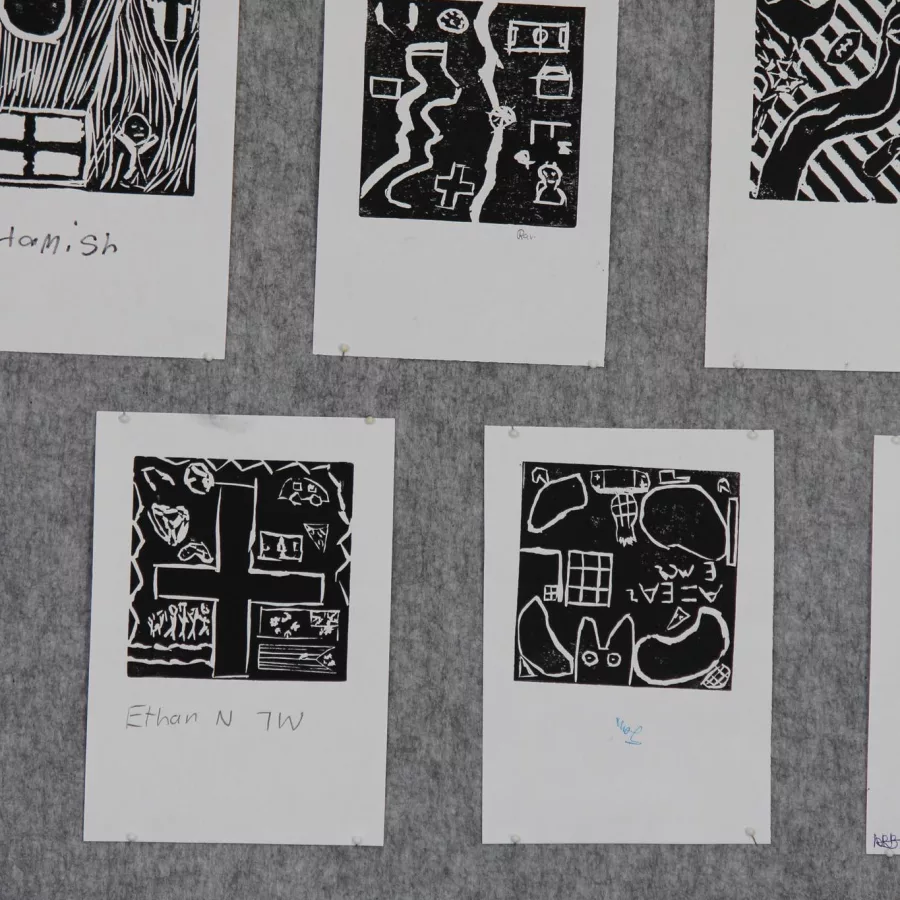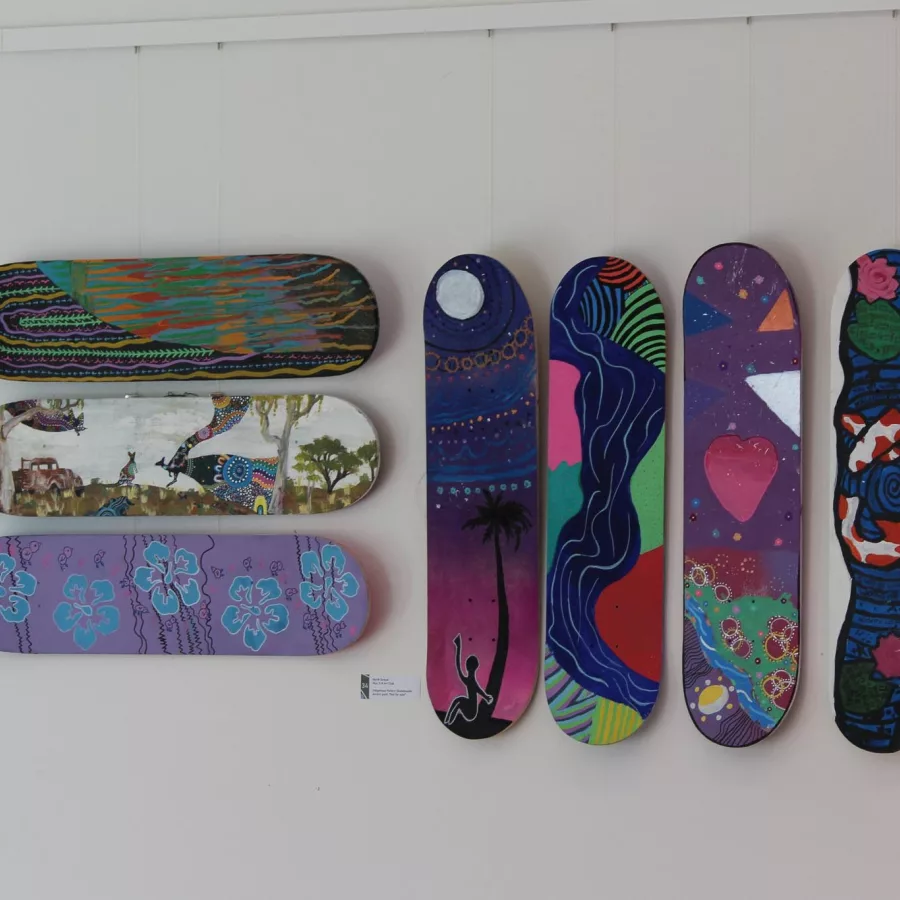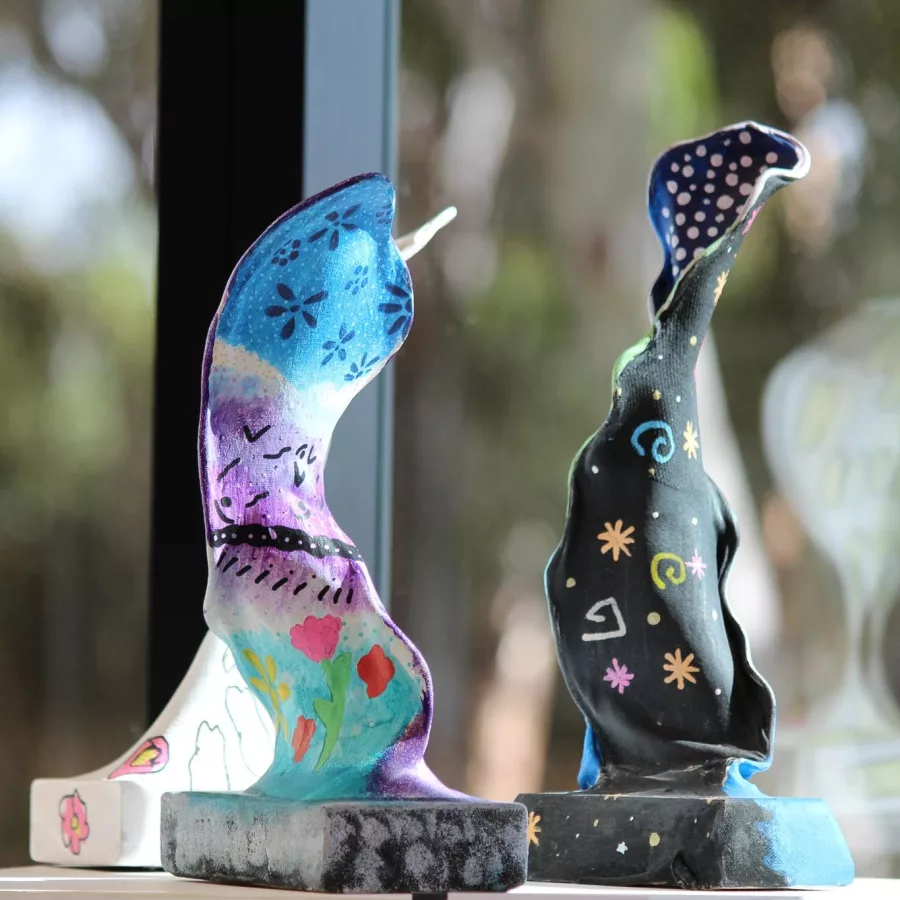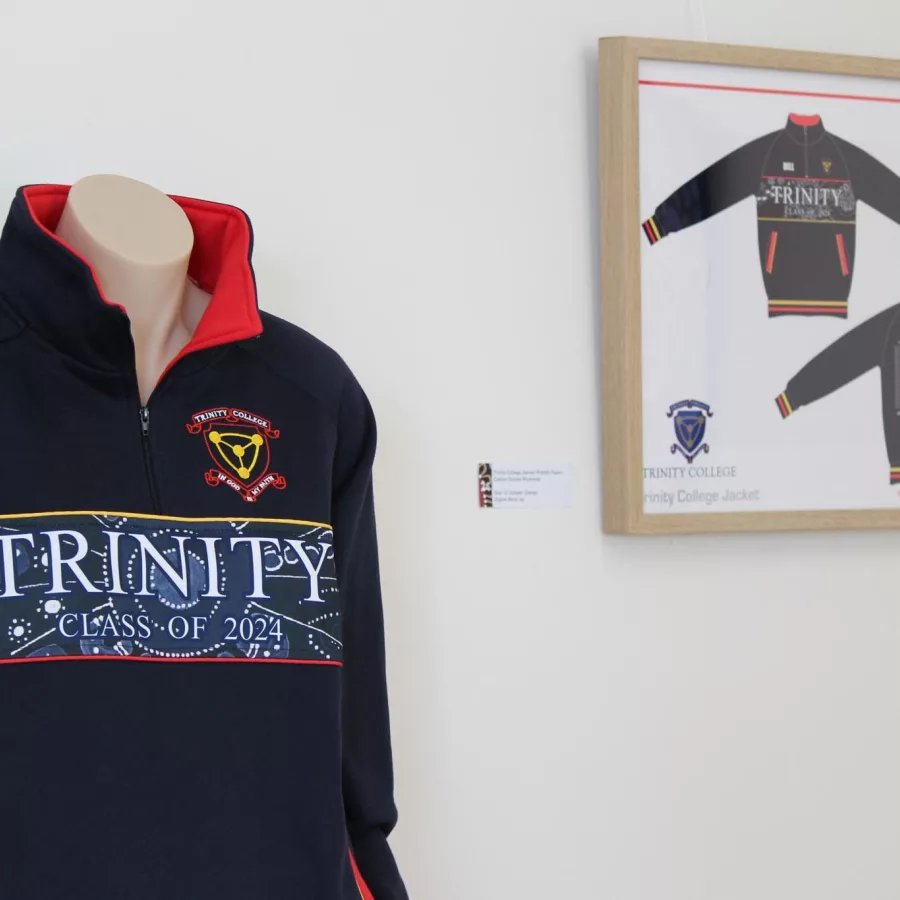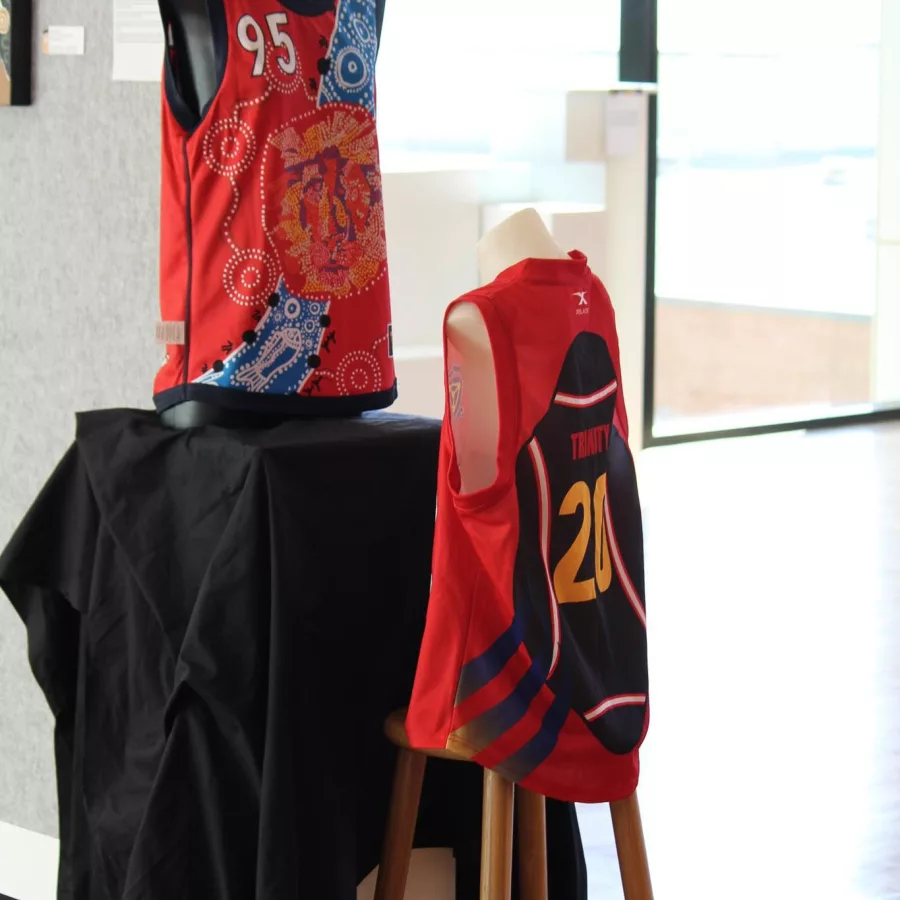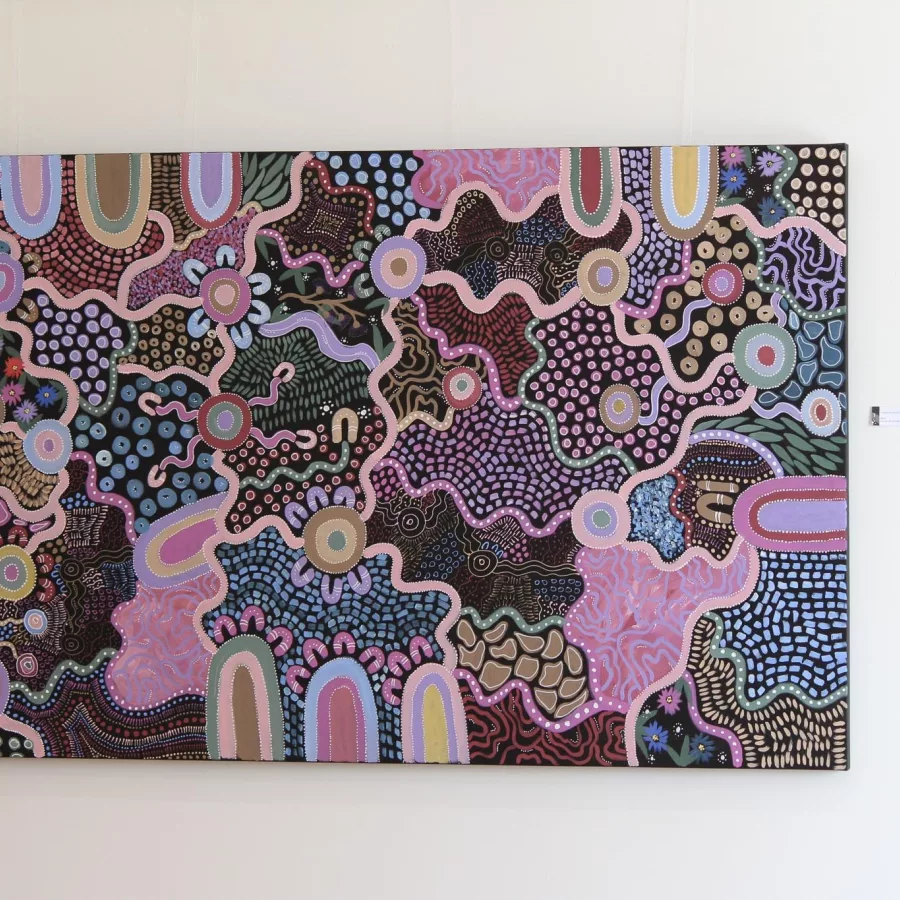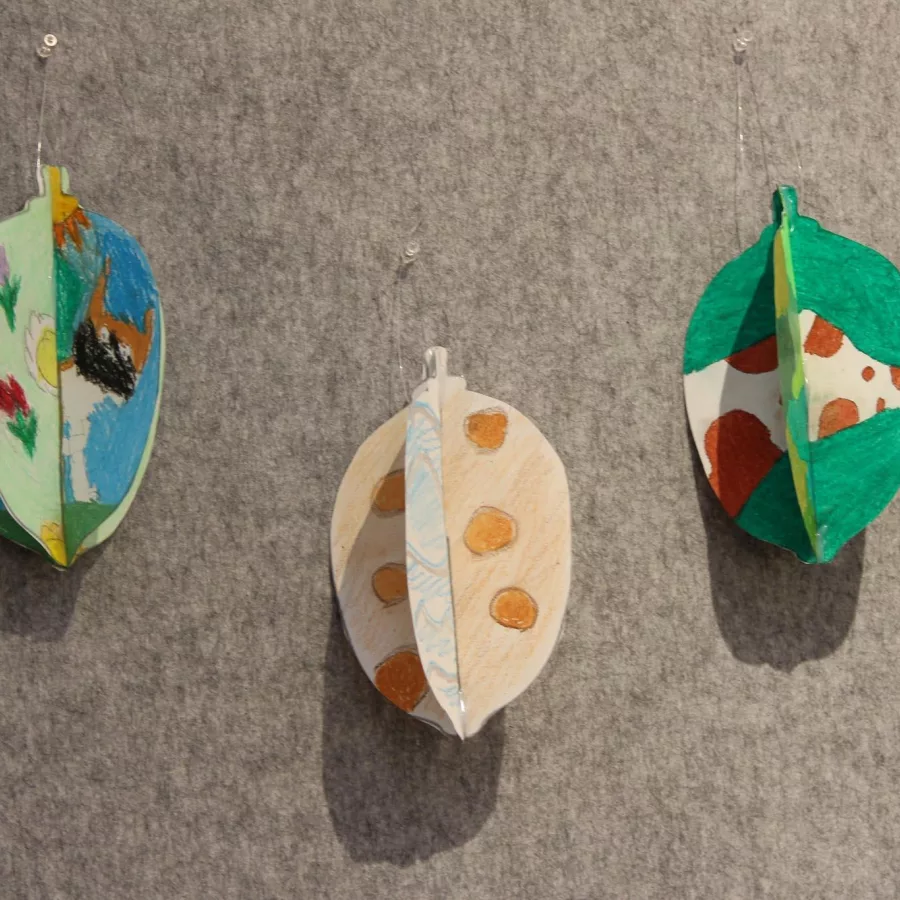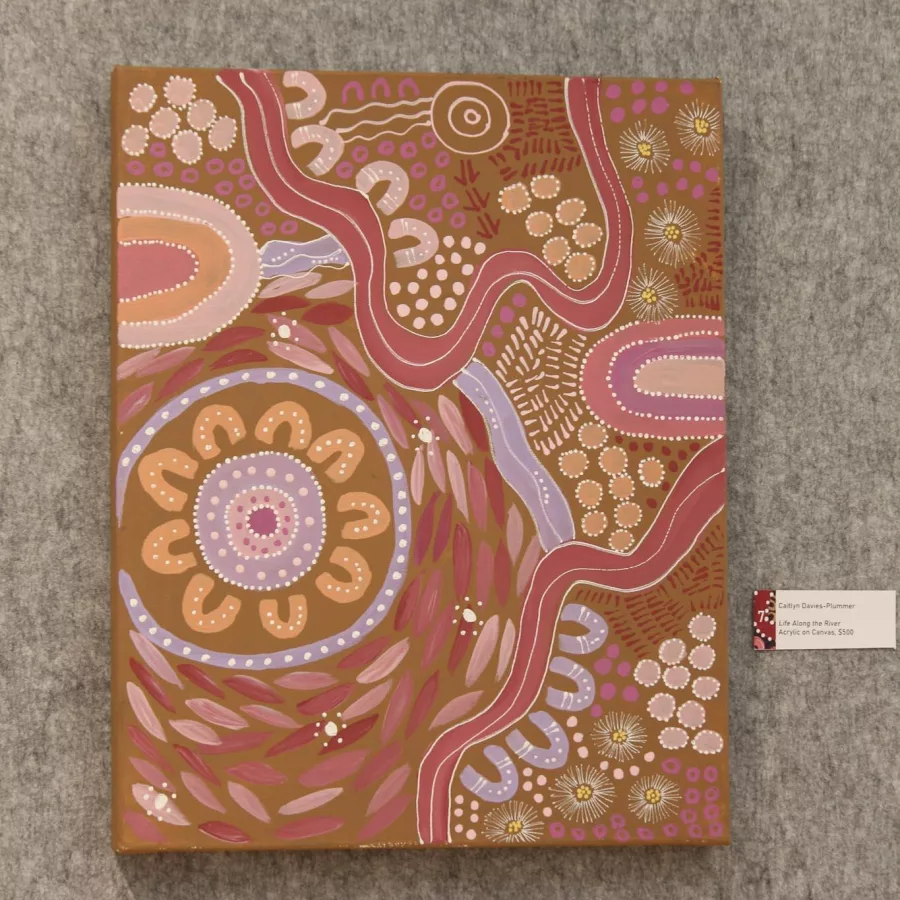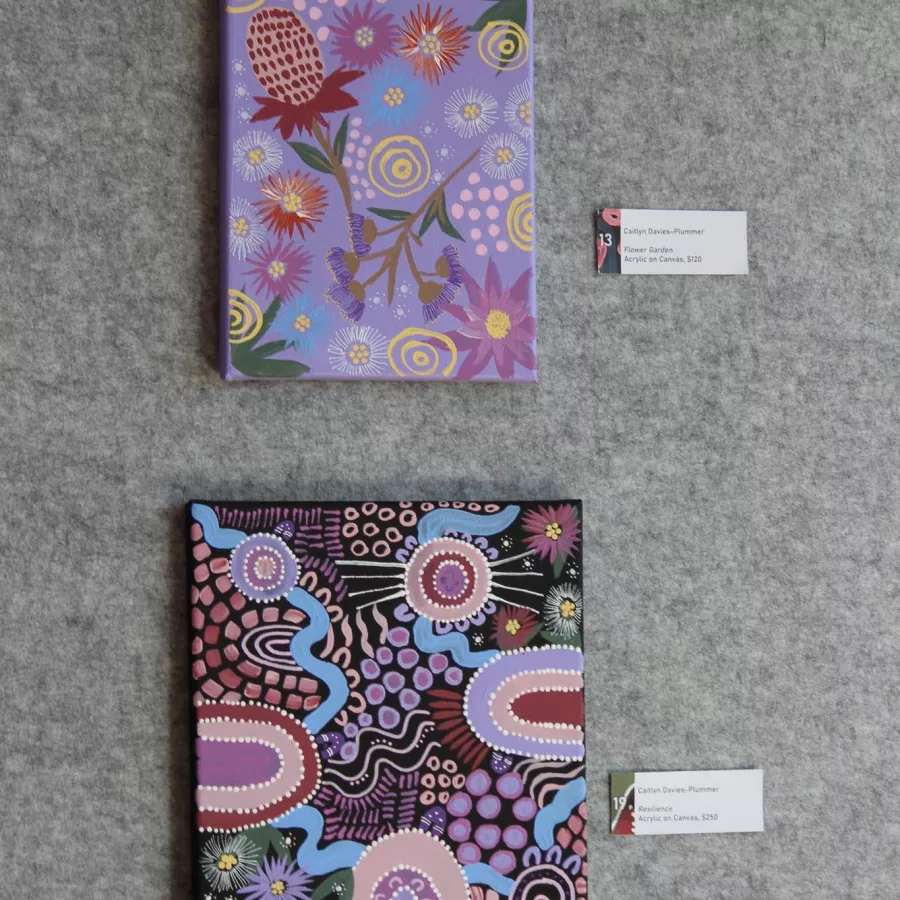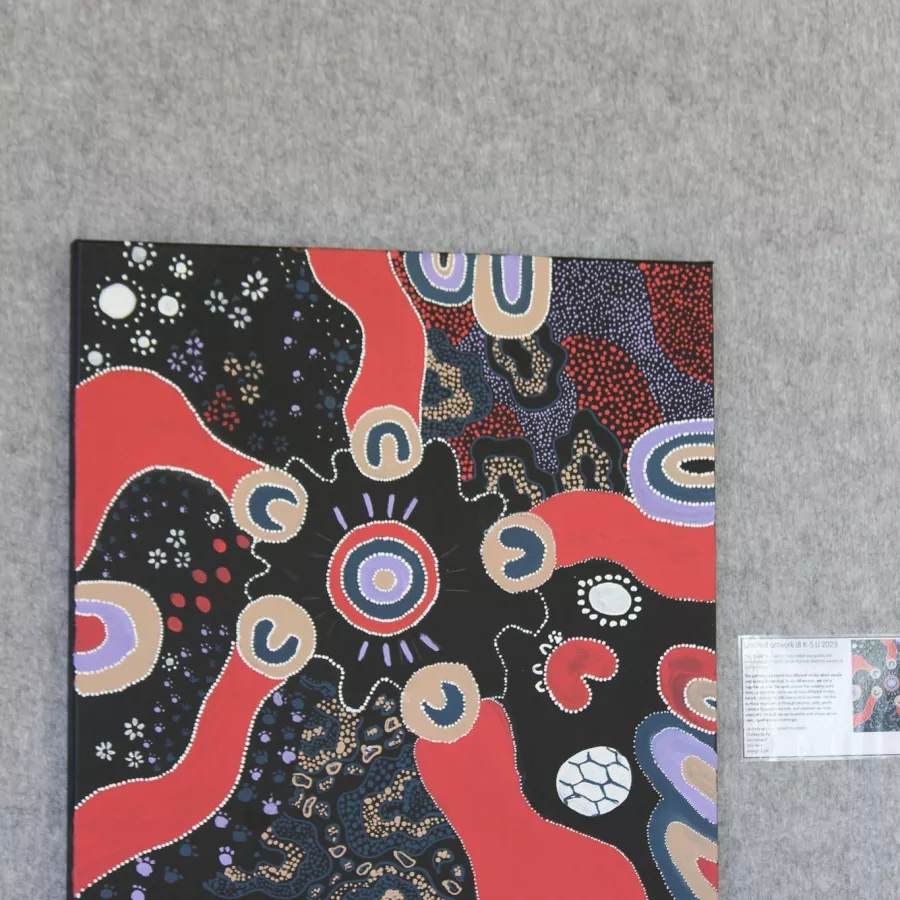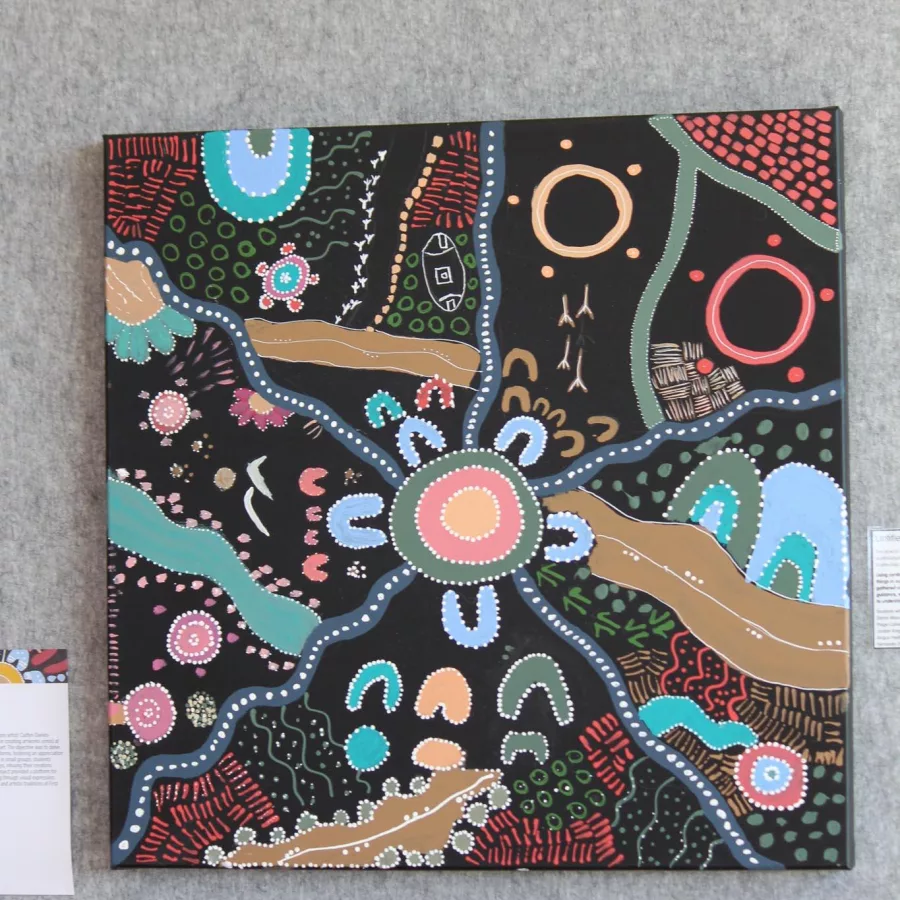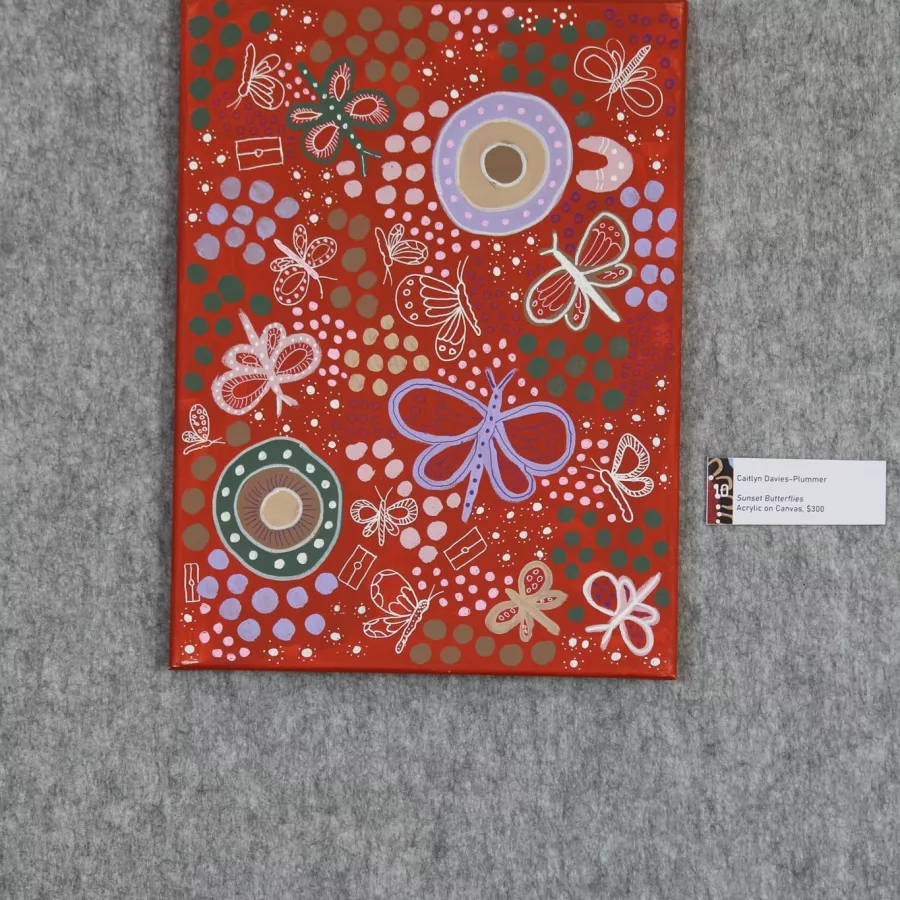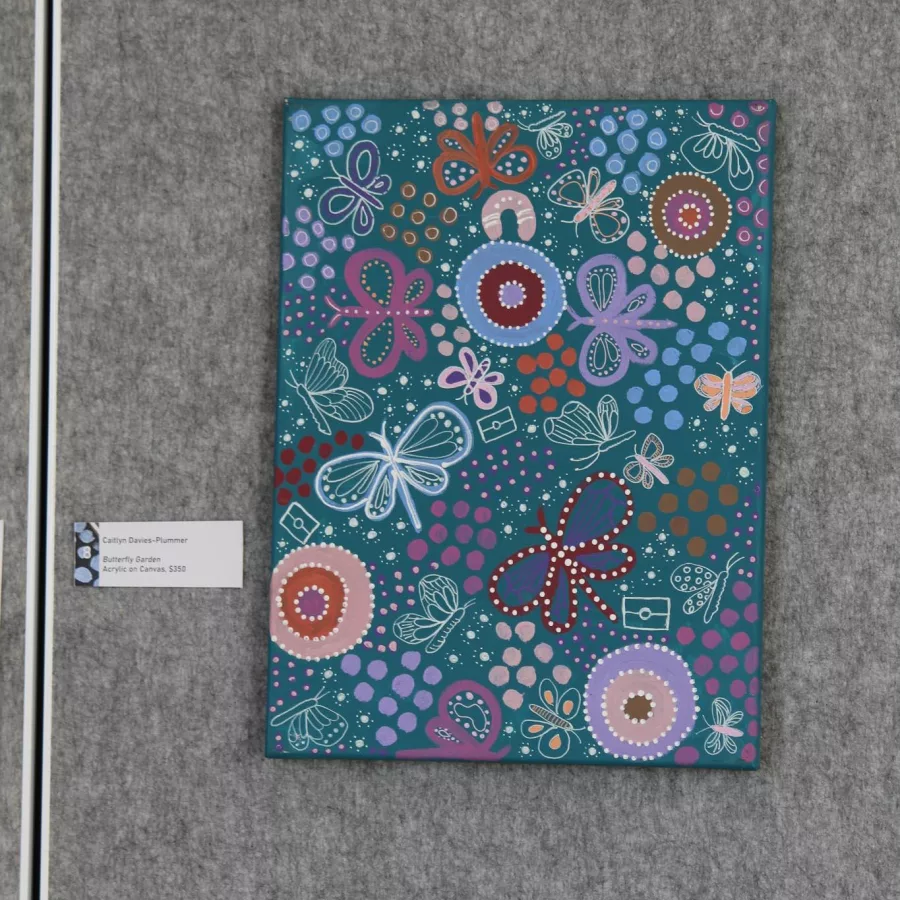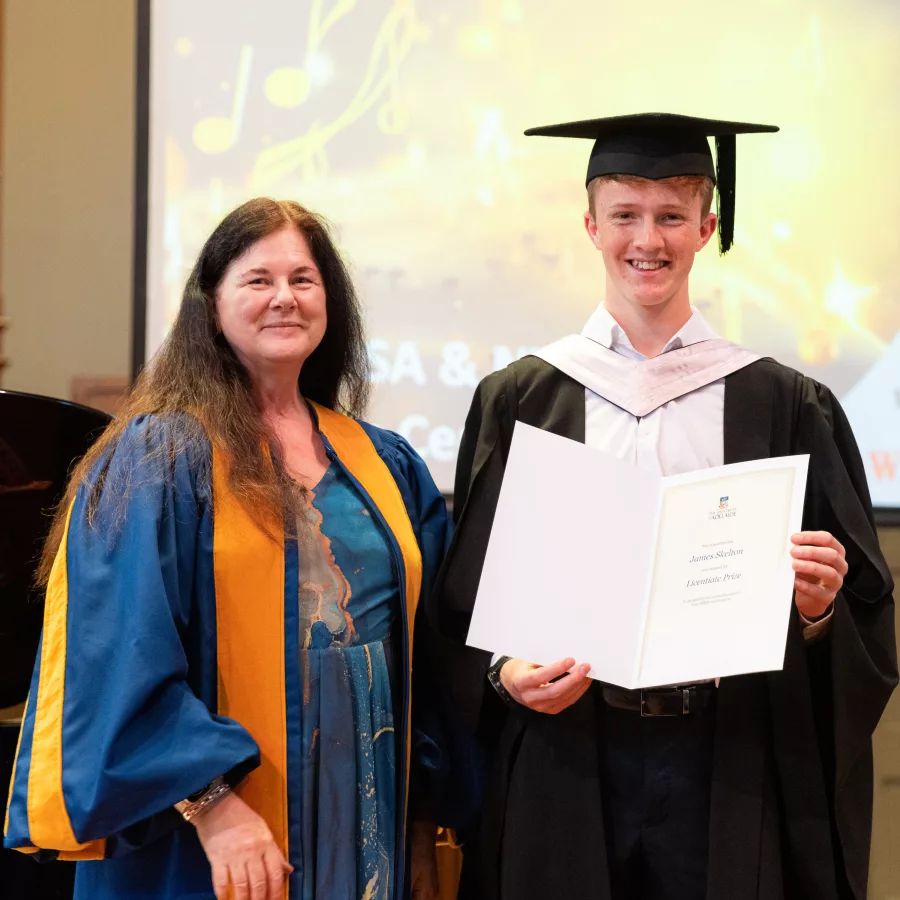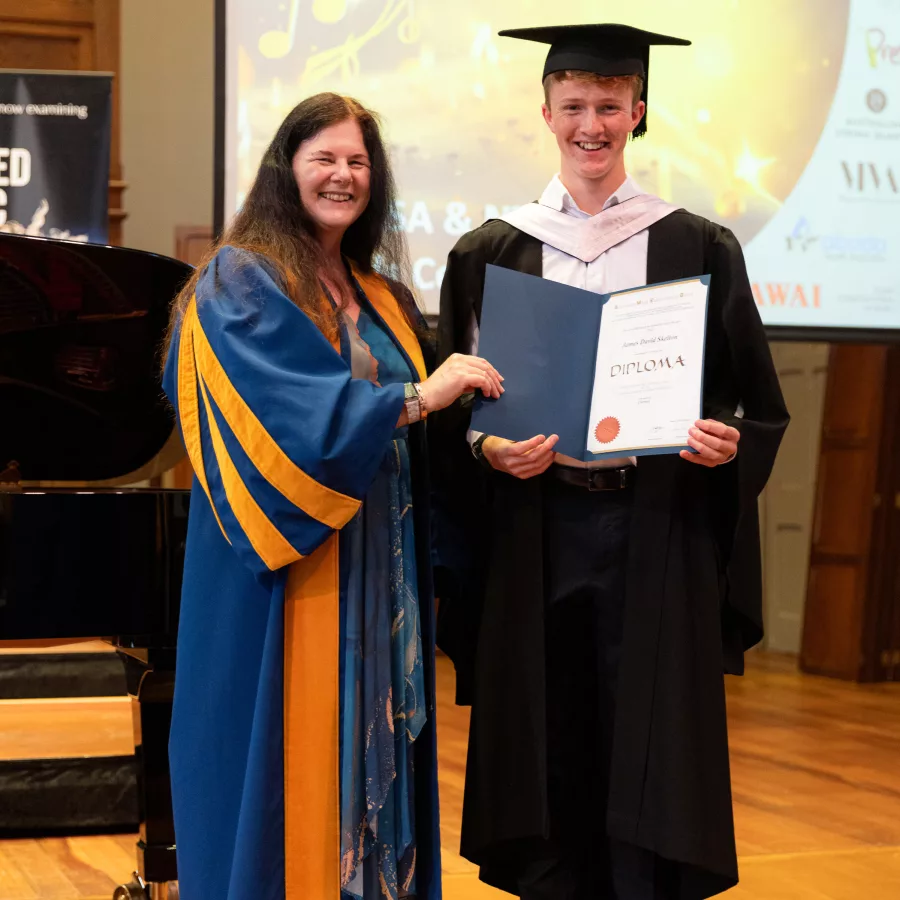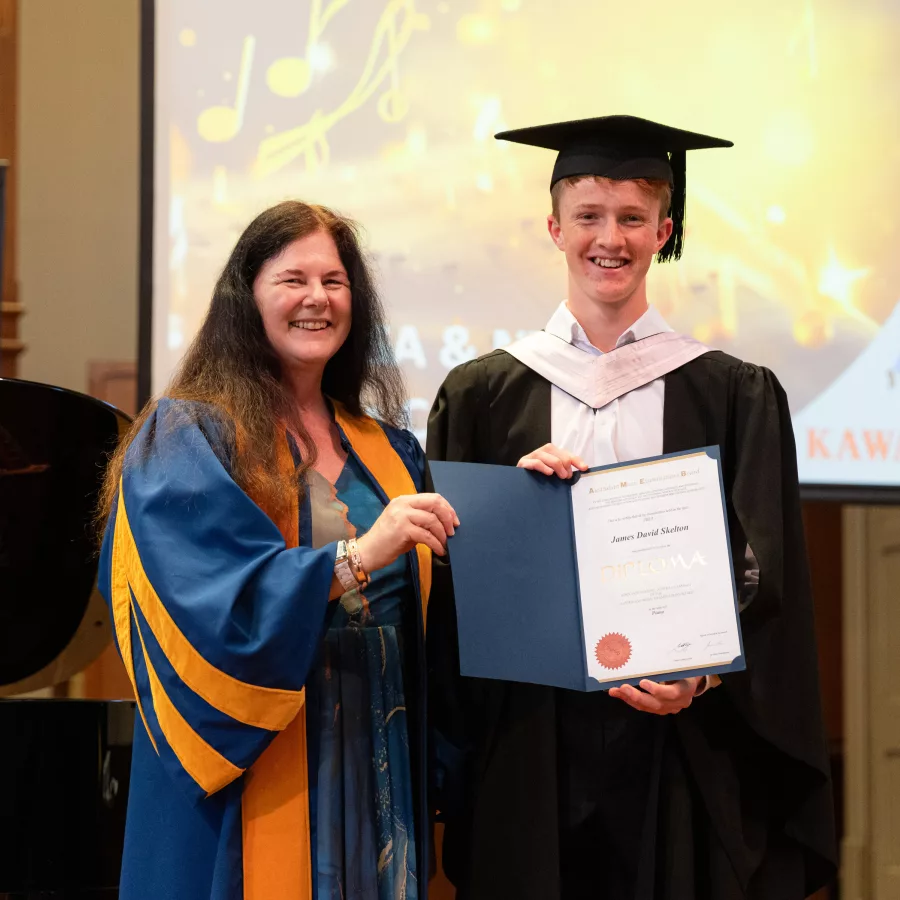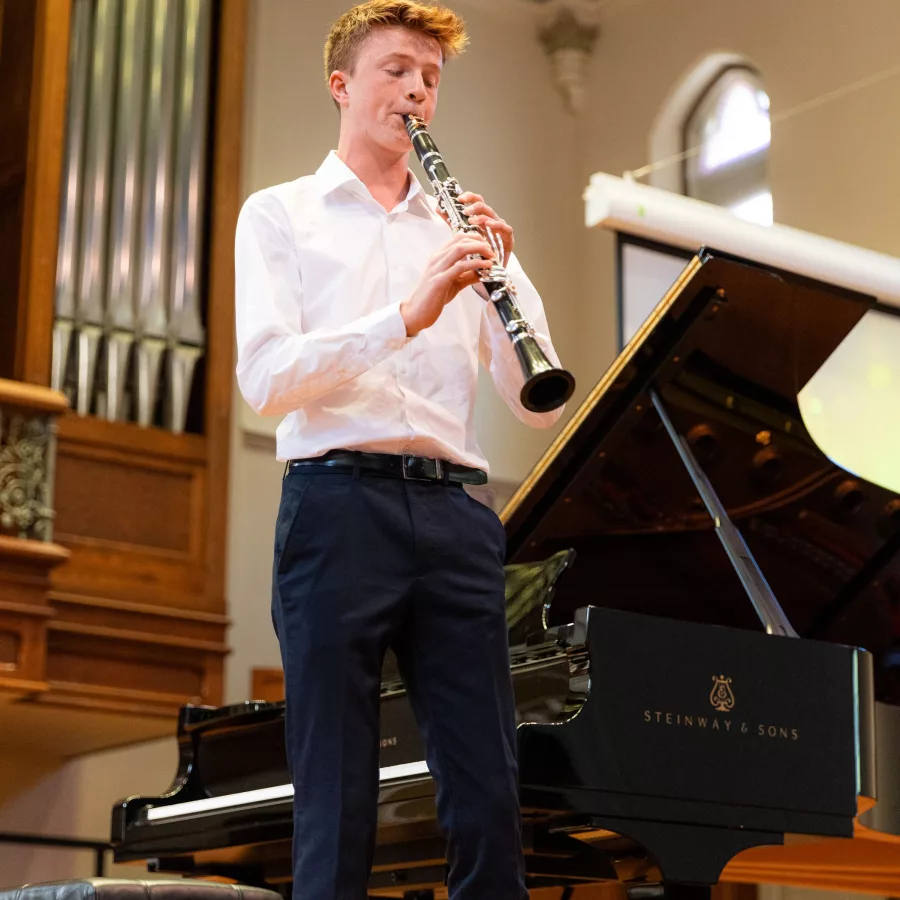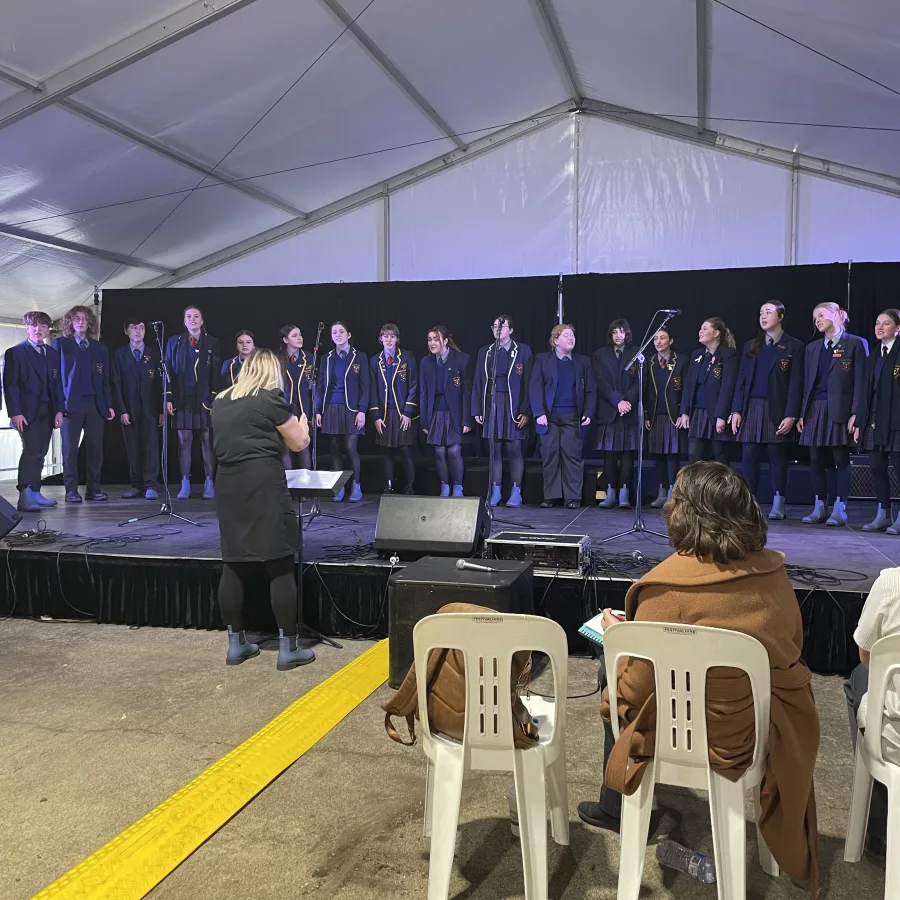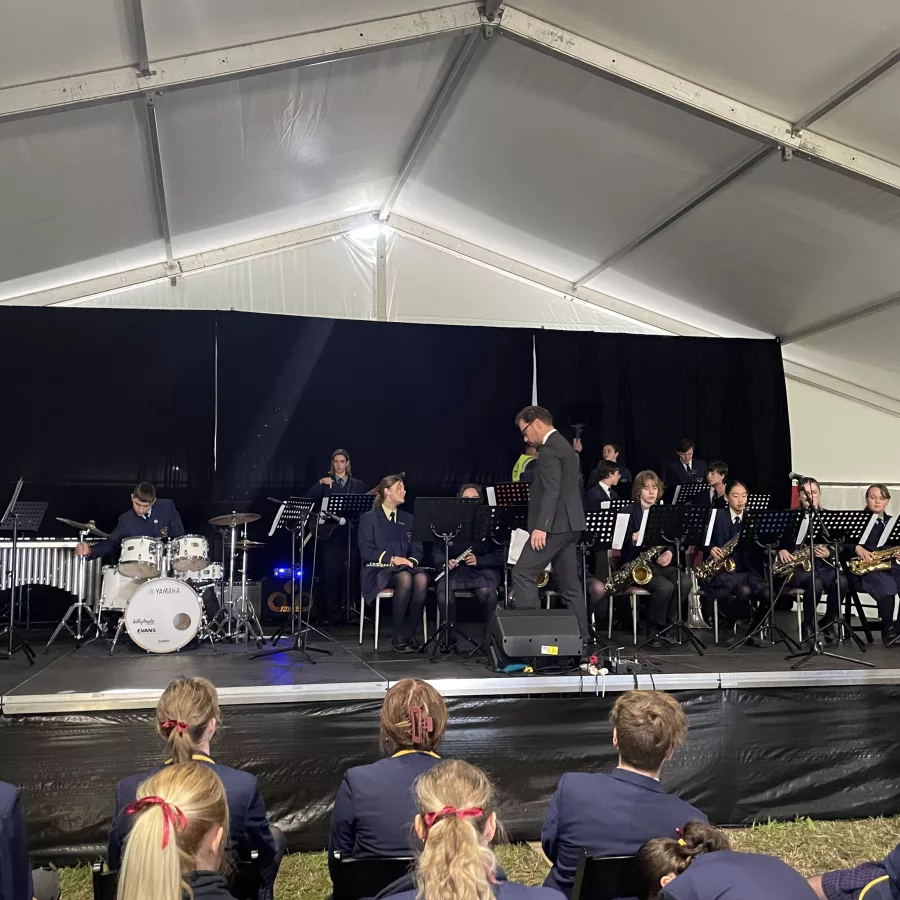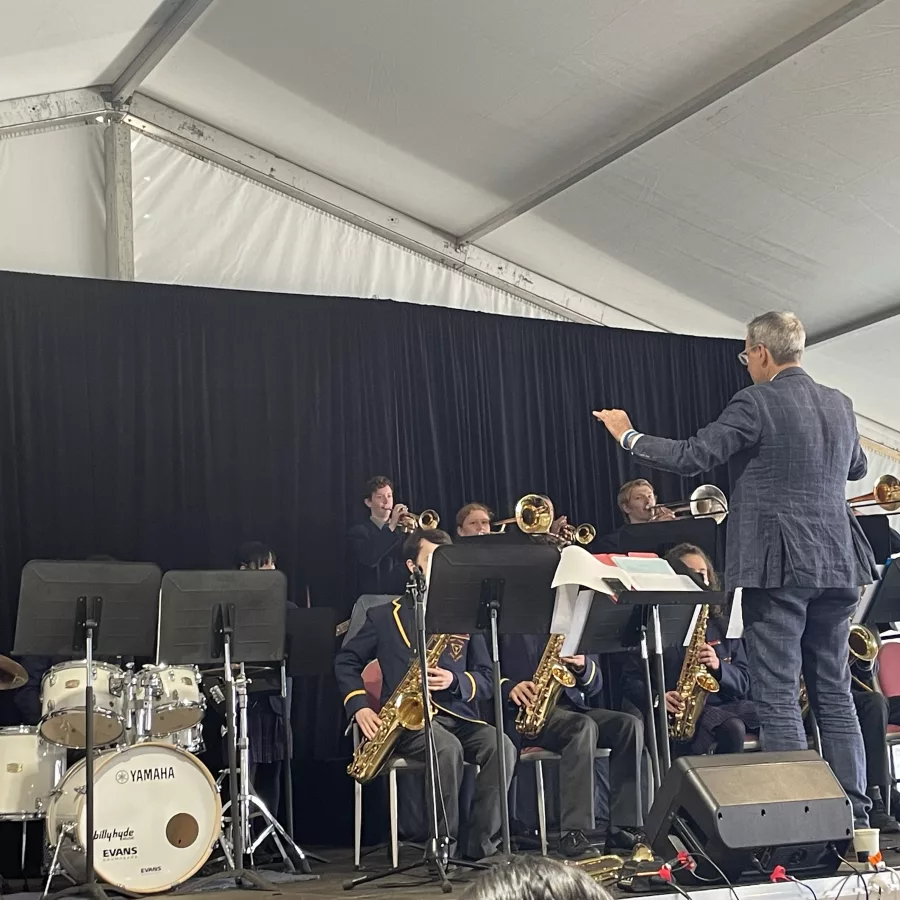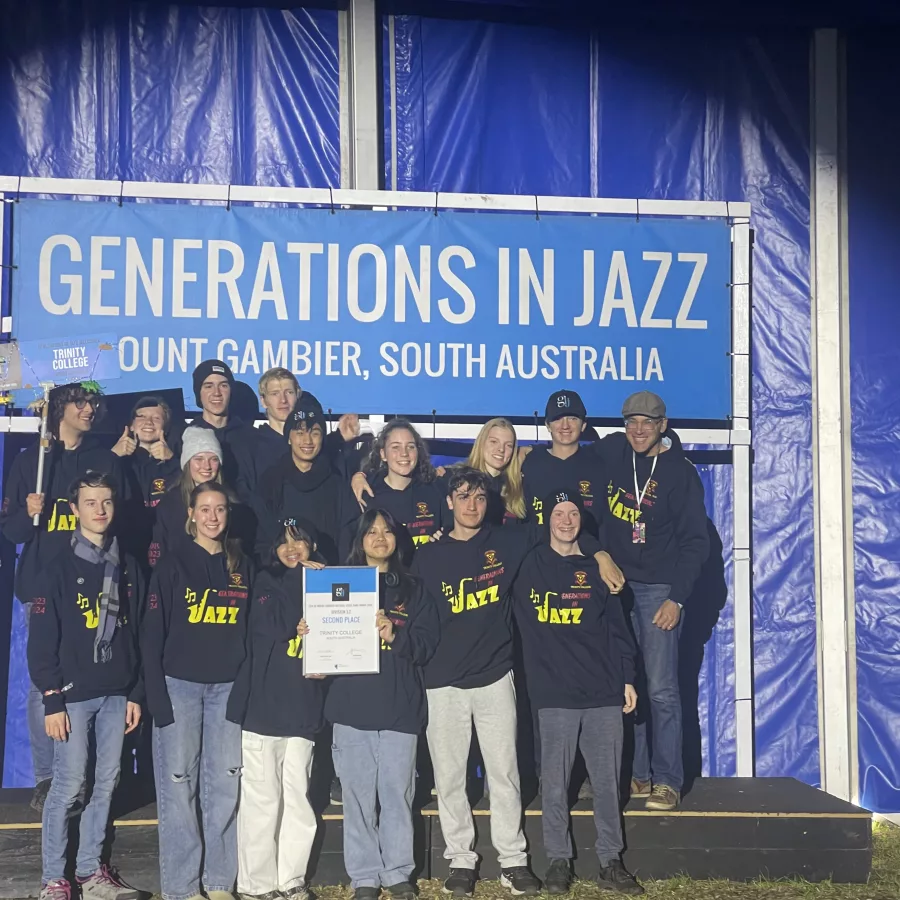May, 2024
Reconciliation@Trinity Exhibition Opens
On Friday 24 May staff, students and the wider community gathered in the TICS gallery for the opening of the latest exhibition Reconciliation@Trinity.
As part of the College’s ongoing commitment to reconciliation and learning, the exhibition is showcasing work created by students that explore First Nations perspectives.
Additionally, the exhibition also features work from proud Barkindji woman Caitlyn Davies-Plummer (Dustin-Koa Art).
Trinity Receives Australian Education Excellence Awards
The annual Australian Education Awards is the leading independent awards event.
The awards showcase the top-performing schools, principals, department heads and teachers for their outstanding achievements and transformative work that makes a profound difference to the lives of young people across Australia.
In 2025 we are thrilled to announce Trinity College has once again been recognised as a leader in education securing three awards.
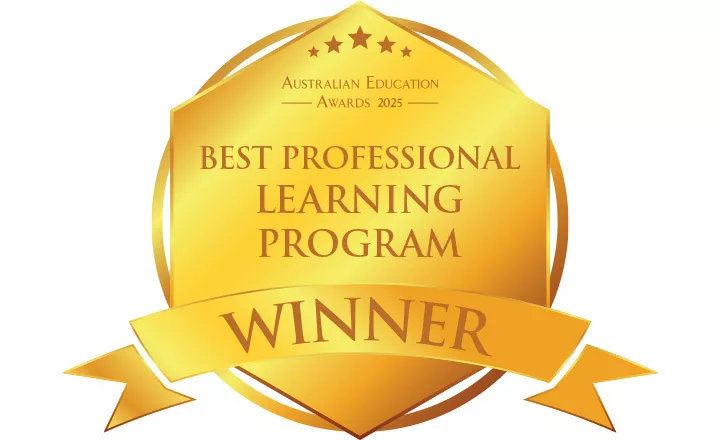
2025 Best Professional Learning Program
Trinity College was announced as the winner of the 2025 Best Professional Learning Program in Australia at the Australian Education Awards on Friday 8 August 2025.
This award recognises the most outstanding professional (staff) learning and development program, or initiative implemented in an Australian school in the 2024 academic year. When judging this category the following criteria was considered:
- Innovation and excellence in program design and delivery
- Demonstrated support for individual professional learning and links to individual and school-wide learning priorities
- Contribution to improved student learning outcomes
- Effective collaboration, reflection and feedback
The College launched its staff professional learning program in 2020 with clear aims: integrate practitioner inquiry, complexity thinking and learning analytics into day-to-day teaching to boost student outcomes. Early staff cohorts tackled foundational modules, establishing shared concepts before branching into research collaborations and peer-led projects.
Since named “Catalyst”, the more formal program emerged from an informal “journal club” model, driven by teachers eager for deeper expertise in complexity thinking, learning analytics, and adaptive practice. A partnership with the University of South Australia Education Futures was leveraged to provide solid academic foundations, while Trinity’s Research Institute ensured practicality and resonance with classroom challenges.
Community voice is central to Catalyst’s ongoing development. Teacher networks, surveys, and focus groups gather timely feedback that shapes both topic choice and pacing. Students drive teacher research, as teachers respond to student needs in the classroom through the development of a reflective and reflexive culture, and measure shifts in areas like self-efficacy or belonging. Regular updates - shared through staff forums, infographics, and short videos - promote transparency and a sense of collective ownership.
The success of “Catalyst” can be attributed to how it unites complexity thinking, teacher inquiry, and pragmatic adaptive leadership, bolstered by Trinity’s Research Institute and the University of South Australia. Staff engage in micro-credentialled modules, research-based projects, and reflective collaboration, leading to a sustained culture of inquiry and practice-based evidence. Studies have included meaning and purpose in Year 12, the impact of feedback on self-efficacy, and creative self-assessment. Participation in these offerings soared from 10 teachers to reach over 340 Trinity staff, with data revealing myriad outcomes including stronger engagement, literacy growth, and richer classroom experiences. This ongoing cycle of feedback and adaptation continues to strengthen teacher professionalism and student outcomes at Trinity College.
See a full list of National Education Award winners here.
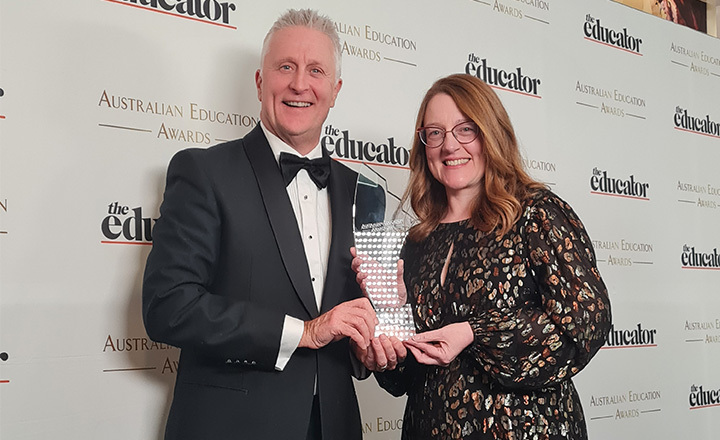
This award recognises excellence in the use of education technology by an Australian school in the 2024 academic year. When judging this category the following criteria will be considered:
- How the technology has fulfilled a need in or outside the classroom
- Impact of the technology on the school
- Change management and implementation process
- Evidence the technology has supported student learning outcomes
Through the strategic integration of AI, Trinity College is using technology to foster critical thinking, creativity and real-world problem-solving. With AI-focused rubrics, immersive learning experiences and professional development initiatives, the College has empowered both students and educators to be safe and responsible digital citizens. By prioritizing ethical AI use, data security and collaborative inquiry, Trinity College has positioned itself as a leader in innovative education technology, ensuring staff and students are equipped with essential skills for a rapidly evolving digital world.
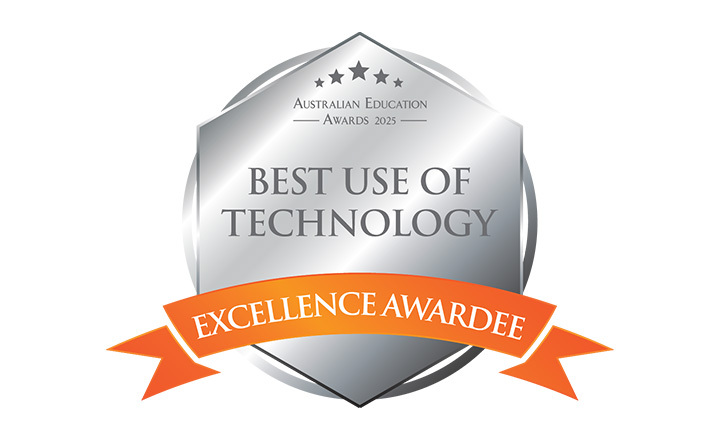
This award recognises the most outstanding professional (staff) learning and development program or initiative implemented in an Australian school in the 2024 academic year. When judging this category the following criteria will be considered:
- Innovation and excellence in program design and delivery
- Demonstrated support for individual professional learning and links to individual and school-wide learning priorities
- Contribution to improved student learning outcomes
- Effective collaboration, reflection and feedback
Catalyst unites complexity thinking, teacher inquiry, and adaptive leadership, bolstered by Trinity’s Research Institute and the University of South Australia. Staff engage in micro-credentialled modules, research-based projects, and reflective collaboration, leading to a sustained culture of inquiry and practice-based evidence. Studies include meaning and purpose in Year 12, the impact of feedback on self-efficacy, and creative self-assessment. Participation soared from 10 to 340, with data revealing stronger engagement, literacy growth, and richer classroom experiences. This ongoing cycle of feedback and adaptation continues to strengthen teacher professionalism and student outcomes at Trinity College.
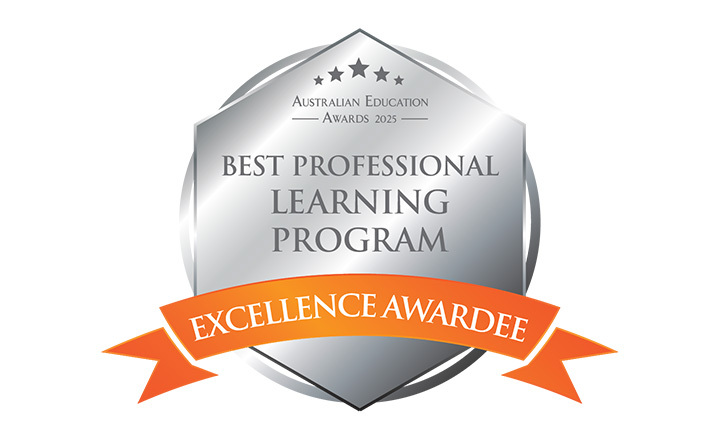
This award recognises the most outstanding teacher in a school in Australia who has been an educator for five years or less. When judging this category the following criteria will be considered:
- Positive impact on students’ learning experiences and outcomes
- Commitment to professional development and collaboration with colleagues to address student learning needs
- Engagement with parents and the wider school community
- Demonstrated commitment to the education profession and potential to become a future school leader
Joshua Kerr’s (Senior School Drama Teacher) approach to teaching Performing Arts at Trinity College is deeply embedded in providing students with real-world experiences, addressing the common misperception that the Arts are not a viable career pathway - merely a creative outlet. Leveraging his background as a professional performance artist, he infuses his classes with industry knowledge, promoting a culture of creative professionalism. This approach involves students taking on significant roles within a communal ensemble, functioning as a company with its own charter, encompassing technical production, staging, and performance.
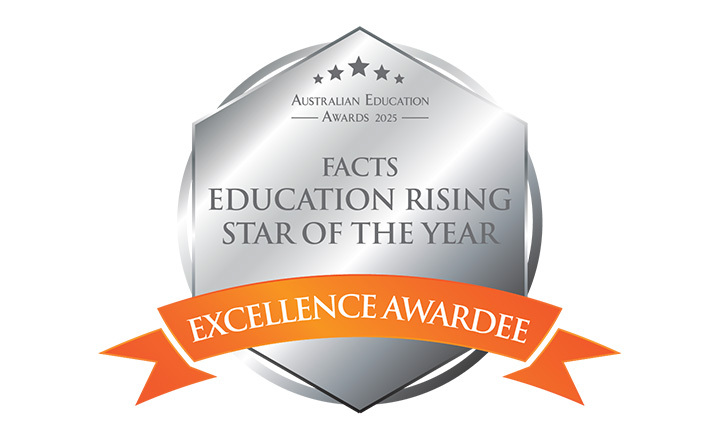
Trinity College was announced as the winner of the won 2024 Best STEM Programme in Australia at the Australian Education Awards on Friday 9 August 2024.
This award recognises the most outstanding STEM-based project or education program implemented by a school in Australia during the 2023 academic year. When judging this category, the following criteria is considered:
- Demonstrated school leadership and support of STEM education.
- Consistently high standards of STEM teaching.
- Staff participation in professional learning and collaboration to improve STEM education.
- Evidence of student engagement and outcomes in the 2023 school year.
The Trinity College STEM Programme is called – SPARK. The curriculum spans Early Years to Year 10 and is committed to creating holistic STEM experiences that foster lifelong learning, incorporates innovative technologies and illustrates how the union of Science, Technology, Engineering and Mathematics will drive future innovation and change. Incorporated within the SPARK Programme is an immersive 5-day experience for students in Year 7.
The SPARK curriculum is strategically structured as a learning continuum, ensuring that at each developmental stage the program;
- develops inquiry skills, digital literacy, computational thinking and creativity;
- aligns with the Digital Technologies National Curriculum;
- promotes cross-curricular connections; and
- empowers a collaborative learning community amongst educators.
Establishing a professional learning exchange across Trinity College, The University of South Australia and the wider education community is what makes the SPARK program rigorous, innovative and impactful. To promote wide-spread STEM teaching and learning, professional development is strategically scheduled and staff are invited to co-construct learning objectives, experiences and team teach with College STEM leaders.
The SPARK Programme is evidence based and informs contemporary educational research. Student self-reported attitudes towards STEM subjects are regularly measured by researchers from the University of South Australia. Over the past 12 months, the lead STEM educators at the College have presented the following professional development opportunities to local and national audiences:
- Assessment Design in the Age of AI.
- Promoting Creativity and Critical Thinking with AI.
- Creative Communication with A.I.
- Integrating Technology authentically across the Middle School curriculum.
- STEM Educator Series.
- Curriculum Mapping: A Cross curricular approach.
The SPARK Programme has had wide-spread impact on the way technology is embedded by staff across the College. By strategically prioritising collaborative planning and staff professional development, there has been increased teacher capacity, enabling STEM opportunities to evolve beyond the SPARK curriculum. For example, Virtual Reality creation and drone flying is now regularly utilised in Geography, Artificial Intelligence supports creatively communication in Science and 3D Modelling is applied in Mathematics to assess student learning of probability concepts. See a full list of national winners here.
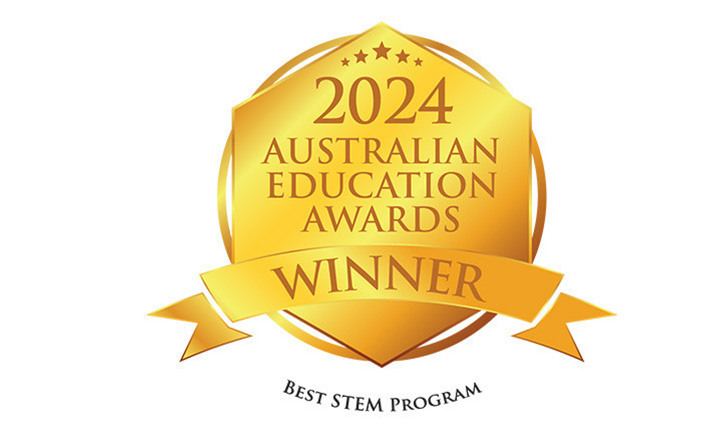
2024 Best Stem Program – Trinity College SPARK Program
This Excellence award recognises the most outstanding STEM-based project or education program implemented by a school in Australia in the 2023 academic year.
When judging this category, the following criteria was considered:
- Demonstrated school leadership and support of STEM education
- Consistently high standards of STEM teaching
- Staff participation in professional learning and collaboration to improve STEM education
- Evidence of student engagement and outcomes in the 2023 school year
The SPARK immersive experience features workshops that are designed to align with the Digital Technologies National Curriculum, create cross-curricula connections, highlight diverse industry connections, and empower students to become inquirers, analysts, and innovators. Students are shown how to use new hardware, actively encouraged to innovate and be creative problem-solvers. The SPARK program is evidence based and informs contemporary educational research. Student self-reported attitudes towards STEM subjects are regularly measured by researchers from the University of South Australia.
In 2023 the SPARK Program was invited to represent South Australia at the 2023 Prime Ministers Prize for Science in Canberra.
This Excellence Award recognises the most outstanding Department Head in a school in Australia based on the 2023 academic year.
Samantha has a proven track record of leading the way for women in the field of STEM. As Department Head she has a commitment and drive to leading the STEM programs with consistently high standards of teaching and innovation. Her leadership of improvement in curriculum delivery and student learning has seen many new activities launched across the STEM offerings.
In 2023 Samantha organised our Trinity Innovation and Creativity School to be the host venue for the “Innovative New Models for Recognition of Holistic Learning” conference on behalf of the Association of Independent Schools of South Australia. As the host school, Samantha created a valuable forum for the exchange of best practice ideas.
She also created a TICS Educator Series. Through a series of Professional Learning Opportunities, Samantha regularly invited staff from across the College to attend training sessions on VR, Augmented Reality and cross-curricula planning.
This award recognises excellence in curriculum design in an Australian school.
The Trinity College Blackham Environmental and Conservation Centre (BECC) has a new initiative to provide diverse, inclusive, and engaging outdoor experiences for younger students. Its programs safely take students out of their comfort zone and encourage them to develop their self-confidence and mental fortitude by taking safe risks. By incorporating First Nations’ history and culture and teaching the importance of sustainable living, the BECC allows students to develop a deeper appreciation for our nation’s cultural diversity and the beauty and fragility of our environment. This alternate learning environment fosters student curiosity and imagination and encouraged problem-solving and collaboration amongst the students.
This award recognises the most outstanding STEM-based project or education program implemented by a school in Australia.
The Trinity College SPARK program received the prestigious title of "2022 STEMM Educator of the Year at the South Australian Science Excellence and Innovation Awards”. This acknowledges a team of educators who have delivered a holistic learning experience for our students and promote lifelong learning, interdisciplinary connections, and technological innovations.
The SPARK immersive experience features six workshops that are designed to align with the Digital Technologies National Curriculum, create cross-curricula connections, highlight diverse industry connections, and empower students to become inquirers, analysts, and innovators. Students are shown how to use new hardware, actively encouraged to innovate and be creative problem-solvers.
This award recognises the most outstanding department head in a school in Australia.
Samantha has a proven track record of leading the way for women in the field of STEM and Innovation having been presented with the;
- 2022 SA Science Excellence & Innovation Awards – STEMM Educator of the Year (Team).
- 2021 Australian Education Awards – Department Head of the Year (Excellence Awardee)
- 2021 SA Science Excellence & Innovation Awards – STEMM Educator of the Year (Finalist)
These public acknowledgements are testament to Samantha's exceptional contributions to STEM education and her dedication to inspiring the next generation of STEM leaders.
The Trinity College SPARK Program was announced as the winner of the STEMM Educator of the Year – Primary or Secondary School Level Category at the SA Science & Innovation Awards on Friday 25 November.
The Trinity College SPARK Program is a future-oriented STEM curriculum. Through an immersive five-day experience, students engage in interdisciplinary and technological themed learning activities that develop inquiry skills, computational thinking and creativity.
The design, implementation and evaluation of the SPARK Program at Trinity College has truly been a team effort and the impact on teaching and learning has been published in the Mathematics Education Research Journal.
As exemplary educators, innovative curriculum writers and contemporary researchers, the team of Samantha Andonis, Steve Grant, Wayne Jaeschke and Sion Harman are at the forefront of STEM education and are leading educational innovation throughout South Australia. Click on the image below to watch a short video about the Trinity College SPARK Program.
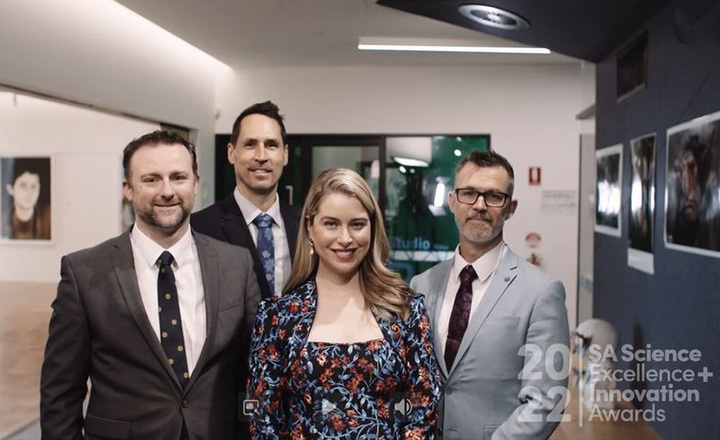
Trinity College has once again been recognised nationally with an Excellence Award in the Australian Education Awards 2022 Best STEM Program category for the ‘SPARK’ initiative.
The ‘SPARK’ initiative is a future orientated STEM and digital technology program. It involves seven specialist STEM educators facilitating a session and implementing pedagogical strategies to promote student agency and problem-solving, and to showcase how digital technologies can enrich learning.
One component of ‘SPARK’ is a 5-day immersive experience where Year 7 and Year 8 students engage in interdisciplinary and technological themed learning experiences that develop inquiry skills, computational thinking and creativity.
The SPARK immersive experience includes:
- Doctor Drones: Using the Engineering Design process, students collaboratively build a drone attachment to successfully fly medical supplies to the remote areas of Nepal. Designs, routes and written programmes were evaluated for efficiency to encourage refinement.
- Robotic Engineering: Students become robotics engineers needing to solve the technological challenges associated with autonomous cars. The robotic vehicles were coded to move at various angles and use advanced sensors to measure distances and aspects of tilting.
- Technology in Sport: To understand the role of data in society, students wore GPS trackers to monitor physical performance. Students applied scientific inquiry skills to inform goal-setting and team tactics.
- Mathematics of 3D printing: By applying mathematical concepts such as measurement and geometry, students were challenged to remodel the generic “spinning top”. 3D models were programmed using TinkerCAD, and once 3D printed, were tested and evaluated.
- Do Your Bit: Using the Design Thinking Process, students prototyped a device that would promote positive mental health. To establish empathy, students brainstormed the local and global social challenges faced by children, adults and the elderly. Once a target audience was selected, students created sketches and programmed the BBC Micro:Bit to sense environmental stimuli and incorporate user inputs.
This award recognises excellence in the use of education technology by an Australian school. When judging this category the criteria considered was:
- How the technology has fulfilled a need in or outside the classroom
- Impact of the technology on the school
- Change management and implementation process
- Evidence the technology has supported student learning outcomes
The Trinity Innovation and Creativity School (TICS) in its first year of operation continues to help us meet the challenges of a greater reliance on technological solutions but permits us to explore new technologies, develop teacher capacity and lead the way with STEM programmes.
This award recognises the most outstanding professional (staff) learning and development program or initiative implemented in an Australian school. When judging this category the criteria considered was:
- Innovation and excellence in program design and delivery
- Demonstrated support for individual professional learning and links to individual and school-wide learning priorities
- Contribution to improved student learning outcomes
- Effective collaboration, reflection and feedback
Recently nine staff were presented with Professional Learning Certificates in Future Oriented Learning (PCFOL) which is a key component of the work of the Education Futures unit at UniSA to understand how to best implement and sustain innovation in schools. In 2020 staff participated in the PCFOL through the Trinity Research Institute This work is led by Mr Wayne Jaeschke (Director of Research & Learning Services) and the result is a whole-of-College engagement in data-informed professional learning that transforms education and builds new understanding about the way schools develop the capacities students need to flourish in a rapidly changing world.
The College is thrilled to announce that STEM Co-Ordinator, Ms Samantha Wyatt has been acknowledged as the Best Department Head of the Year by the judges of the Australian Education Awards.
This award recognises the most outstanding department head in a school in Australia. When judging this category the criteria considered was:
- Demonstrated commitment and drive to lead
- Consistently high standards of teaching
- Leadership of innovation and improvement in curriculum delivery and student learning
- Commitment to professional development and collaboration with colleagues to address student learning needs
- Engagement with parents and the wider school community
This National recognition for us as an organisation acknowledges how we are leading the way with the teaching of new skills, outstanding staff professional development offerings and immersing the learning experience for our students across the curriculum with technology.
The Trinity Innovation & Creativity School (TICS) completed in December 2019, was named as an Australian Education Awards 2020 Finalist in the category of, Innovation in Learning Environment Design.
The new school building (TICS) is the result of a rigorous consultation process between architects, educators, students, parents, our wider community and with our university partners. The design was informed by a growing body of knowledge in learning design for the 21st Century and reflects the increasing dependence of technology in the workplace, along with greater need for critical and creative, collaborative working skills.
The TICS design features spaces intended to reflect that pedagogical shift – with flexible, fluid spaces; being multi-textural and multi-purpose; with embedded and integrated collaborative ICT services; break-out spaces alongside classrooms and a lecture theatre, with facilities for VR and 360-degree immersive environments.
Technology chosen for TICS reflects the need for students to be across industry standard tools in a variety of different areas. Additive manufacturing (commercial grade 3D printers), virtual reality and 360 projection are examples of technologies that are becoming key for students to participate in emerging industries.
The College is developing in students a self-directed approach to learning. This learning space gives students the opportunity to develop greater ownership of the learning environment. From the ability to make their own room bookings, to the many breakout spaces on offer, the design of this learning space enables students to craft their own experience. For example, view Year 8 student Ryan who has produced his own podcast “The Road to the Big Time” available on Spotify and Youtube.
Trinity College seeks to improve educational practice to support young people to succeed personally and academically at school and, in their lives beyond school. With our University partners, Trinity has co-developed a research agenda which has deepened the capacity of teaching staff to engage in powerful and purposeful reflection and evaluation of educational practices within this new space. Teachers will be upskilled in educational research, and contribute to the growing body of knowledge in 21st Century learning spaces through Masters and PhD study and publication.
The Educator’s sixth annual Innovative Schools list reveals fifty schools making the most profound and exciting impact in Kindergarten to Year 12 education. Trinity College was named in this list from over 300 schools.
In 2020, the COVID-19 pandemic forced Australian schools to implement massive changes to their existing models as face-to-face classes shifted online.
While this no doubt posed enormous challenges across all areas of education, parental engagement and student wellbeing, some schools saw some unique and exciting opportunities to innovative and improve the way they deliver teaching and learning, not just in 2020 but well beyond the pandemic.
Education professionals are constantly looking for new ways to enhance student learning and engagement and increase productivity. Schools around the country are implementing new initiatives, technology and methods of learning and teaching that are moving the education industry forward.
The Educator Innovative Schools report seeks to showcase those schools at the forefront of change and innovation. From new learning spaces to curriculum design, use of technology and more, these schools are trying new approaches to teaching and learning that are shaping the educational landscape of the future. Find out more here.
College Captain Wins Licentiate Prize for 2023
On Saturday 6 April, Year 12 student and current Trinity College Captain James Skelton was announced as the winner of the prestigious AMEB SA & NT Licentiate Prize for 2023 at the annual Australian Music Examination Board Award & Graduation Ceremony held in the University of Adelaide Elder Hall.
The award is presented to the candidate who achieved the highest result of any instrument in the Licentiate examinations and is an outstanding achievement by the talented musician.
In addition to the Licentiate Prize, James was also presented with two additional awards, L.Mus.A (Clarinet) with Distinction and A.Mus.A (Piano) with Distinction.
The prizes were all conferred and presented by Professor Jennie Shaw, Deputy Vice Chancellor and Vice President (Academic): The University of Adelaide. In addition to receiving his awards, James was also invited to perform a solo at the event as a special guest artist.
Generations in Jazz Success
Over the past weekend 49 students took part in the national music competition Generations in Jazz in Mount Gambier.
Joining over 5000 students from across Australia, students in the Stage Band 1, Stage Band 2 and the Jazz Vocal Ensemble were immersed in a world of music including world class performances, performing on stage, connecting with music students from other schools and participation in workshops.
All three of Trinity College ensembles performed exceptionally well! The Stage Band 1 took out second place in their division. After winning second place last year in the division below, the band worked incredible hard as they took on the challenge of going up to the next division. To achieve second place in the higher division is an unbelievable result for the band. Huge congratulations to Andrew Newhouse and his students.
Stage Band 2 attended for the first time and played at their very best, doing themselves and the College proud! The adjudicator was impressed with their balance of sound as they performed with so much confidence under the wonderful direction on David Shigrov. Congratulations to Year 10 student and trumpet player Sebastian Curtis who had the honour of being selected for the super-band in their division. This is an incredible acknowledgment of his talent as only one of four trumpet players from across all schools who played in the division!
The Jazz Vocal Ensemble finished just shy of placing in their division. They performed incredibly well and particular mention was made of their outstanding stage presence and sound. Performing a very challenging piece, these students did Trinity proud! Unfortunately impressing the wrong adjudicator (the adjudicator for the next section!) who made a particular effort to say how wonderful she thought the group was and that she would have scored them very highly!
Special thanks to Andrew Newhouse and and David Shigrov for all the work they have been doing with the Stage Bands in the lead up to this event. We are very fortunately to have such a wonderful team of committed and talented staff who support our students to reach their potential in music.
Thanks also to Michelle Seyfang, one of our amazing instrumental staff, who came along to support the students and staff on the trip as well as the wonderful Brink Smit who drove the bus for us. It was great to have you both part of the team!
Thank you to all staff across the College for supporting these students and the music program at Trinity. It was evident over the weekend that our students weren’t just amazing on stage, but also off stage. They are really great people who displayed respect, leadership and kindness throughout the weekend.
Another highlight of the weekend was a visit from the Premier of South Australia Peter Malinauskas MP who announced the state government will grant over $700k to the event next year. This event is getting bigger and better and is something very special that our students get to be a part of.
Source: Kristy Triantafilakis, Director of Performing Arts


